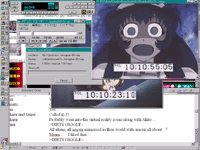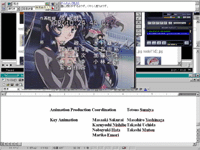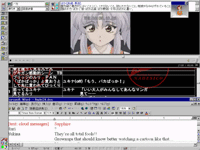 |
 |
 |
Reference Sources
Nadesico was a work that drew from a wide body of
material, ranging between contemporary Japanese culture and its symbols,
current Japanese mass media culture, the anime culture and the jargon coming
from that industry, and physics as well as quantum mechanics. For
this reason, the work was littered with specialized terminology and industry
jargon. I relied on a wide assortment of material to translated these
terms. The material that I relied on the most was the Martian
Successor Nadesico 1000% Collection Digital Mook CD-ROM published and
distributed by King Records / Kadokawa Shoten. The first three volumes
of Newtype's Martian Successor Nadesico Film Books that are part
of the Newtype Film Book series, Martian Successor Nadesico PERFECTS,
a Newtype 100% Collection, and other publications were also important sources.
Regarding other technical terminology, I relied
on interviews with friends in Japan, the Internet itself, and my collection
of books proved useful.
日本からナデシコ1000%の取り寄せ
作品の翻訳が決まった段階、わたしはアメリカにいました。仕事を受けたがいいが、近くの本屋に行って資料を買って来られるわけでもありません。それにいくら仕事関連と言ってもナデシコ関連の書物を右から左に片っ端に買う訳にも行きません。それで何よりも重宝したのがナデシコ1000%のCD-ROMでした。沢山の情報がつまっているのはもとより、アフレコ台本がまるまる収まったいるのが本当に助かりました。くわしくは書きませんが、後半これが大きく響いて行く事になります。
それで友人に依頼してCD-ROMを日本で購入してもらったのですが、冗談で彼とCD-ROMの内容をインターネットとICQを経由して転送する話をしていたのです。そのまま盛り上がった結果、本当にやってしまいました。CD-ROMのデータ内容は正味543MB。一刻も早くこの仕事に取り掛かりたい、導入したばかりの512KBpsの高速DSL回線を試してみたい、それにCD-ROM丸まる転送するなんて馬鹿みたいで一度はやってみたい、などと言った考えが交差する中、2日間がかりでやってしまいました。当時日本の友人はISDNしかなかったので最高転送速度毎秒7Kを上回ることはありませんでしたが(わたしの方は最高毎秒60K近くまでできるのですが、)それでもできました。300Bpsモデム時代のことをかんがえるとすごい世の中になったものだとしみじみ感じます。
もっともCDROM本体が届いたのは一週間もしないうちだったのではっきりいって転送する意味は余りありませんでした。
Securing
Nadesico 1000% from Japan
When the final "go ahead" was issued for translating
Nadesico, I was in America. While happy over being given the project,
nevertheless there was the difficulty of securing reference of the material.
Where I live, I cannot simply run out and buy reference at the local bookstore.
And while this might be work, I could not justify going out and having
all manners of books pertainning to Nadesico to be sent to me. In
that respect, the Nadesico 1000% CD-ROM was a God send. Not only
was it full of all types of information regarding Nadesico, but it also
contained the entire AR script. I won't go into depth here but later
on, this would prove to be of invaluable importance.
So I arranged for a friend in Japan to buy it for
me. We got to talking about sending data through ICQ and jokingly
we talked about transfering the entire contents of the CD-ROM through ICQ.
We said "Why not?" and went ahead and actually did it. The total
of data amount in the CD-ROM was 543MB. Thoughts such as "I want
to start working on translating as soon as I can," "I want to stress test
this 512kBps DSL line I just got," and "I've always wanted to do something
stupid like transfering an entire CD-ROM" went through my mind as two days
pasted before the transfer was completed. At the time, my friend
only had ISDN, which meant that the maximum through put was about 7k/sec.
(my DSL line is capable of about 60k/sec) but we still went ahead and did
it. Realizing that it wasn't long ago when many of us were using
300Bps modems on our terminals, it's amazing how times have changed.
Actually, the CD-ROM itself arrived in about a week,
so there was no real point in transfering the contents of the CD-ROM.
翻訳神具(ナデシコ翻訳編)
Tools
of the Trade (Nadesico Translation)
どれくらい人が関心を示すか判りませんが、ナデシコを翻訳していた最中の環境を説明しましょう。
I'm not sure if people are interested but the following
is the environment in which I conducted the Nadesico translation.
ハードウェア
 |
 |
 |
翻訳原稿付属資料の準備
ナデシコは内輪ネタ、文化ネタ、オタクネタの連続の作品でもあり、作品の中で帰結しているネタも数多くある作品でした。専門用語も多く、伏線やシリーズ後半にならないとはっきりしない話題などもあります。これを多少整理する為に別に翻訳原稿に付属する資料も準備しました。ロハでやりました。自分で勝手にやったものなので全然構いません。部分的ではありますが、ここの記事はその翻訳原稿付属資料に含まれている情報を転載しています。
Preparation
of the Supplemental Reference Source
The Nadesico was full of in-jokes, references regarding
Japanese culture, and the otaku culture, and needless to say it was also
had contained numerous references that tied into material within the work
itself. There were many specialized terms, subtle hints, and issues
that remain unresolved until the later half of the series. To organize
all this information, I prepared a reference source that accompanied the
translation I sent out to ADV. I did it for free. It was something
I did on my own so I didn't mind. Parts of this article are based
on material I wrote in that document.
ルリルリの台詞回しの気苦労
Worry Over Ruriruri's Lines
「バカばっか」の台詞の難しいさはいうまでもないにしても、ナデシコに関わった脚本家の多くはルリにとても大事な台詞をたくさん言わせるので、気苦労しました。なかでもルリルリ三部作の第一作「ルリちゃんの『航海日記』」(5話)と第三作「水の音は『私』の音」(18話)はやりがいのある仕事でした。
It goes without saying just how difficult it is
to translate the line "baka ba'ka," but beyond that, many of the
screenwriters of Nadesico used Ruri as the vehicle through which numerous
important lines were delievered, leading me to take particular care over
how I translated Ruri's lines. The first (episode 5) and third (episode
18) of the Ruriruri tripartite saga were especially interesting to work
on.
さて、問題の「バカ」ですが、これについては翻訳原稿付属資料で私は次のように説きました。
On the subject of the controversial "baka," I said
the following in the supplemental reference
source.
TVシリーズの翻訳が完済した後、私は次の文章を書き加えました。バカな私達…
このシリーズの中でもっとも翻訳が困難な台詞でしょう。まわりに向けて放たれるルリの決め台詞とも言えるこの表現は日本アニメ界では誰もが容易に識別できる記号となりましたし、アメリカアニメ界でも浸透することでしょう。問題は「バカ」の意味がいくつもあることで、わたしはこれらの意味合いを丁度よく包括できる英語の表現を見つけるには至りませんでした。Foolを活用した理由はこの表現以外で充分な意味合いに幅がある英語の表現を思い付かなかったからです。それにこの表現ならルリの性格に似合うだろうと思いました。ルリはこの広範囲に展開可能な表現を活用して様々な人を批難、哀れみ、或いは決めつけます。その矛先は短絡思考、自己完結思考、誤解・誤認する人、簡単に躍らせられる人、簡単な間違いを犯す人、なにかに完全にとりつかれている人等々、広範囲そのものです。もし個別にこれらの批難を翻訳するとなると"idiots"(白痴)、"morons"(薄のろ)、"dope"(まぬけ)、"dufus"(ぐず)、"airhead"(お天気頭)、"asshole"(恥知らず・野郎)、"dunce"(落ちこぼれ)、"flub"(無様な者)、"goofball"(どじ)、"fool"(愚かな者)などを活用することになるでしょう。困ったことにルリは一つの表現を活用してこれらの罵りを展開していると言うことです。色々思考を重ねた結果、"fool"がもっとも意味合いが近いと判断しました。総ての表現に共通で通用するとは思っていませんが、もっとも広範囲に活用できる表現である思いますし、またルリの口から出ても違和感ない表現であると思ったのです。状況によって発音を左右させることを通して意味合いを変えることが出来るでしょう。但し、ルリの冷ややかな口調を意識しておいてください。The Fools We Are…
This is one of the most difficult lines to translate in this series. The trademark expression that Ruri shoots off at people has become an icon within Japan and probably will become an icon in US anime fandom as well. The problem is "baka" in Japanese has numerous meanings and I have yet to find an expression in English that covers all the bases just right. I have used the expression "fool" in English because I felt that it has the widest breadth and the expression fits Ruri's personality. Ruri uses this catch all phrase to criticize, pity, and/or judge people for being short-sighted, self-absorbed, those who misunderstands and/or misjudges, gets easily carried away, makes simple mistakes, one who is totally devoted, and much much more. If I were to translate the word on a case by case basis, then I would probably employ expressions such as "idiots," "morons," "dope," "dufus," "airhead," "asshole," "dunce," "flub," "goofball," "fool" and so on. The problem is Ruri is supposed use one unifying expression for all of this. So after thinking about this for awhile, the best expression I felt that would fit was "fool." It might not fit all the expressions, but I believe it does the most and also sounds like something very appropriate to come out of the mouth of Ruri. I suppose we can add more intonation by pronouncing the word differently depending on the situation. Just please keep aware of Ruri's cool demeanor type of speech.
尚、「バカ」は様々な意味を包括している他にも、それをどう他人に投げかけるかでそれを口ずさむ人の態度や姿勢を読み取ることが出来ます。「バカ」と言うことは他者を蔑んだり、見下したり、または嘲笑していることを伝えることもありますが、時には諦めや他人への同情、はたまた自己洞察していることを伝えることもあります。"Fool"こそこれらの文芸的要求にもっとも的確にあてはまる英語の表現だとわたしは思うのです。
確かにもう少し賢い翻訳家ならその場その場の状況に合わせた様々な英語の表現を活用するかもしれません。この方法論を採用した方が色々楽ですし、神経を逆撫でするようなことも減るでしょう。しかしながらわたしは元の作品の作品性を出来るだけ損ねないようにする事に一人燃えるバカです。日本語には他にいくらでも違う表現があるにもかかわらず、原作は「バカ」だけでほとんど突き通した以上、わたしは英訳も同じようにするべきだと感じたのです。
これはわたしの個人的解釈ですが、このような計算された「バカ」の作品全体を通した活用はナデシコに記号を与え、シリーズ全体の思考や思想の軸になるものを与えていると思います。キャラクターの行動、ストーリーの展開、ドラマの流れ、そして作中で象徴される出来事や問題はバカバカしいまでに際立った滅茶苦茶さがありました。しかしなおもキャラクターたちは前へ前へと歩みつづけます、それぞれが掲げる使命が互いに矛盾することもありますが、それでも使命に燃えるバカでありつづけるのでした。バカにされることがあっても、かれらは「賢い選択」である、体制の利権の保持へ加担すること、これを最後まで拒否しつづけるバカの集団がナデシコのクルーでした。彼らは最後まで互いを支えあい、そして最後には本当に頑固なバカでしか成し遂げないようなことを見事成し遂げてしまいます。
シリーズの翻訳が終わった現在でも、「バカ」を"fool"に翻訳したことは効果的で正確な訳し方であったと信じています。だからと言っても他のやり方が正確ではないとかおかしいとは申しません。ただ、私の心の中ではもっとも正当な選択だと感じただけです。時折、この翻訳姿勢から逸れたこともありましたが、それでもなお全体的には、簡単な表現が多彩に活用されるという記号論的美しさを取りとめることには成功したと信じています。いろいろ論議がありましたが、もし再びこれを翻訳する機会が発生したとしても私は同じように翻訳することでしょう。What's more, baka not only varied in meaning, but also could signify a wide variation in the tone of the speaker. At times baka is condescending, judgmental, and mocking in tone, but at other times it embodies sorrowful resignation, establishes affinity, and reflects introspection. I would argue that the English word "fool" best meets such a long list of literary demands.
To be fair, a smarter translator would might translate the word into different English words depending on the context of the situation. It certainly would have been much easier and would have ruffled less feathers. But I am baka with regards to trying best to preserve the integrity of the original material. The Japanese used only one term while other perfectly suitable terms are also available in the language, so I wanted to use one term in the English translation as well.
Personally, I feel that the calculated use of baka through out the Nadesico series provides an icon and axiom to the mentality and psyche of the series. The actions of the characters, the plot developments, the dramatic interaction, the issues and representations that araised in the series sometimes boarders on the realm of absurdity (bakarashii.) But regardless the characters press on, adamant and dedicated toward their causes (shimei ni moreru baka,) some of which contradict one another. At times deceived by others (baka ni sareru,) the crew of the Nadesico still refused to take the “smart solution” of accepting the status quo (kashikokunai baka.) But they supported one another and eventually achieved something only the most dedicated and most stubborn headed (gannko na baka) could only achieve.
Even after going through the entire series, I still feel confident that the equating "baka" with "fool" was an effective and accurate approach. This is not to say other approaches are wrong or inaccurate. In my mind, this was the best option. It is true that there was a number of time that I strayed off from this simple equation, but overall I believe I was able to capture the semiological beauty that was embodied with the colorful use of such a simple term. Even after all that's been said and done, I still would have gone with my original choice if I was to be given the chance again.
ちなみこれだけいろいろ言っていますが、英語吹き替え版では素直に「バカ」は「idiot」になっています。口パクとタイミングを合わせるということが、そうする事を要求したそうです。
After that's been said and done, in the end the
dubbed version used "idiot" as a replacement for "baka." I understand
this had to do with the number of mouth movement flaps and matching these
with the English dub version.
ルリの台詞に関するその他のメモ:
Other notes regarding Ruri's lines:
13話の「勘弁して」 (coming soon)
"Kanben shite" in episode 13 (coming soon)
18話の「バカばっか」の由来 (coming soon)
The origin of "baka ba'ka" as revealed in episode 18(coming soon)
木連と地球連合軍の表現比較、或いは「外来語と母国語の使い分けできる日本語はなんーて便利なんでしょう」の巻(coming
soon)
Comparison of expressions
and labels between the Jovian Federation and Earth, or "Isn't wonderful
how Japanese can differenciate between foreign words and domestic terms."(coming
soon)
木連英訳追記 (coming
soon)
More
notes regarding the Jovian Federation(coming
soon)
Jupiter Union, Jovian Federation, The Confederacy of Jupiter...
階級
日本語では陸海空で階級の名前は大差ありませんが、英語ではかなり違います。ナデシコでは海軍中心でやりました。
Ranks
In Japanese, the Navy, Army, and Air Force roughly
use the same terms for the same rank. Unlike the US and Britain,
there is no Naval "Commander" and Army "Lieutenant Colonel." Both
ranks are written out as "chusa" in Japanese. In translating
Nadesico, when ranks came up, I translated them to their US Navy equivalents.
画面情報
もし画面に映り、読めるものであれば総て翻訳しました。これはかなりの量でした。ナデシコは画面内文章を通して様々な情報を視聴者に伝えます。時には何か状況を説明する為(戦闘空域説明図など)、また時には駄洒落を解説する為、またある時は何かに説得力を持たせる為(例えば膨大な量の文章の提示など)や雰囲気を確立する為(店内のメニューや看板など)にこのような画面内文章が活用しています。されていました。
場合によっては文章があまりにも細かく、読解が不可能な時もありましたが、逆に手持ちの資料の中で運良くそのカットが載っている事もありました。こう言った時ほど書籍とCD-ROMを確保できて良かった感じることはありませんでした。
On Screen Text
If it was on the screen and if it was legible, I
translated it. And this was a lot. Nadesico employs a large
amount of visual text to communicate information. Sometime the text
was there to clarify a point (such describing a particular tactical situation)
or to explain jokes, but at other times, the text was there to authenticate
something (as in the case of numerous documents that float about) or to
add atmosphere (as in the example of menus and signs in stores.)
At times the text on the screen was indecipherable
(too small on the screen) but sometimes I was lucky enough to find references
of still shots of cuts where the particular text appears. This was
where all those books and the Nadesico 1000% CD-ROM came in handy.
イズミイズム
最初のうちは、面倒くさい台詞を言うキャラだなー、とマキ・イズミの事を思っていましたが、終いには惚れていました。この人の台詞と来たらもう…。駄洒落はただでさえ難しく、扱いづらいものですが、彼女の駄洒落は常軌を逸したセンスで成り立っている所があります。これを英語で表現することは至難の技でした。時には何日か時間かけて翻訳することもありました。(もちろんその間は他の部分の翻訳を進めたりしていましたが。)でも、結構遊ぶことも出来たのも事実です。
ところでことわっておきますが、いつもいつも日本語の駄洒落をそのまま英語に出来るという訳にはいきません。さすがに「犬の卒倒… ワン・パターン」や「そうか… せんべい…」などそっくりそのまま翻訳することは言葉の性格上無理なので、多少書き替える必要がありました。ただ書き替える時も必要以上変えたりしないようにしたつもりです。イズミの駄洒落はそれぞれなんらかのキーワードがあり、これがシチュエーションの中で成り立っていましたから。英語版でも同一のキーワードは活用されるように出来る限り注意しました。
テープがADVから発売されるにつれ各話に出てくるイズミイズムを解説していくつもりですが、もしイズミイズムに関する強い要望があれば独立したイズミイズムだけに焦点を合わせた解説記事を書くかもしれません。ご意見、ご感想頂ければ幸いです。
それにしても、21話のイズミ様は色っぽくってよかったなー。しみじみ。
Izumism
At first Maki Izumi struck me as an annoying character
that had a habit of saying things that are tremendously difficult to translate,
but by the time I was though, I was in love with her. The things
that she would say... Puns are something always to difficult to translate,
but her puns have an exceptionally delicate and twisted quality to them
that makes it all the more difficult to translate. Translating these
puns into English was NOT a walk in the park. Sometimes I would let
days pass by before I would come up something that "worked." (Naturally
I would move on with translating other sections that are easier to translate
while I awaited inspirations to strike.) On the other hand I have
to admit that she also presented me with the opportunity to enjoy coming
up with new material for her to speak in English.
But I need to make it clear that it was not as if
I could turn Japanese puns into English just like that. For cases
like "inu no so'tou... wan, pata-an" and "souka...
senbei..." (I don't want to give away the translation before the video
is out so please wait a little more for an explanation on the meanings
of these puns,) I could not simply translate them into English and expect
them to work, so I needed to re-write them some what. But I tried
to limit myself to rewriting nothing more than I needed to. In each
of Izumi's pun, there is always a keyword that ties the pun together with
the ongoing narrative; a keyword that helps ground the pun into the given
situation. Naturally, I made every effort to preserve the keyword
in the English translation as well.
I'm planning doing an explaination of all Izumisms
as the tapes are released by ADV, but if there is enough demand for more
on Izumisms, I might do a seperate section especially devoted to Izumisms
in this home page. Let me
know what you would like.
But boy, Ms. Izumi looked great in episode 21.
Damn.
ナデシコの英語
ナデシコが地球から強引に出航する3話。ここでユリカが才色兼備振りを発揮しようと英語でやり取りする所が出てきます。最初この部分を見たわたしはそれなりに英語の発音がしっかりしているなー、と思っていました。でも一応と言うことでアメリカ人の友人にその部分を見てもらい、印象を聞いてみました。結果:ぜんぜんわからない。(苦笑)
どうやら長年日本も暮らしていた結果、日本人の英語に慣れてしまっていたみたいですね。わたしにはわかりやすい発音でもアメリカ人の友人にはちんぷんかんぷん。このままで話にならないので画面に出てくる字幕の翻訳に英語の台詞の書き出しが上乗せされた結果に。
しかも所々で字幕の内容としゃべっている内容が食い違っています。
Nadesico's English
In episode 3, the Nadesico forcibly takes off from
the Earth. Here, as if you show off how Yurika is gifted with both
brains and beauty, a sizable amount of English dialog takes place.
When I listened to the portion the first time, I was rather taken back
at how well her English sounded. But just to be sure, I had a friend
watch the section and tell me what their impression was. Result:
Couldn't understand almost anything that was said.
It appears that after spending so many years in
Japan, the awkward English spoken by Japanese has become so familiar that
I can no longer tell if most English speakers could understand it or not.
Pronunciation that comes across fine to me was indecipherable for my American
friends. I wasn't about to let something like that get by, so I went
ahead and transcribed all the English dialog, on top of translating the
Japanese subtitles that accompanied that portion.
And to top it off, what they are saying and what
was written in the Japanese subtitles does not match at places.
チューリップの謎
チューリップの綴りの話題です。果てさて、チューリップの英語綴りは"tulip"か"chulip"か。最初この問題には気付かず、危うく見逃す所でした。木星側は瓜の形をしたような、表面にきざきざのある巨大な物体をワープ移動の出入り口のように活用しています。二つで一組の仕組みになっており、片方に入ったものが、もう片方から出てくるという具合に物体を移動させることが出来るようになっています。これら「ゲート」は様々あり、もっとも大きいものとなると戦艦や巡洋艦を通すことが出来ます。地球連合軍をはじめとする地球側はこれらの事を「チューリップ」と呼んでいました。さて、この「チューリップ」はもちろん花のチューリップにちなんだ名前ですので、英語の綴りもそれにならうのが当然でしょう。チューリップの英語の綴りは"tulip"です。ところがどっこい、ナデシコ1000%では綴りが"chulip"となっているのです。なぜ綴りが異なるか。それはナデシコに登場するチューリップは単なる愛称ではなく、正式名称の頭文字を取った名前なのです。ナデシコ1000%によれば、「”Cellular
Hangover from Unkown Labyrinthine Intelligence of Prehistorical age” (先史時代の謎めいた未知の知性が残した細胞質の遺物)の頭文字をとってCHULIPと言う。)」とのことです。
日本語では判り難いのですが、これはめちゃくちゃつらい英語です。単語二つが間違っていますし、英語ではこのような文章を通常構築しません。それはさておき、”chulip”の綴りにもちゃんとした裏付けがあったのです。相当表現が間違っていたり、大変な誤解を招く可能性が濃厚でない限り、基本的にわたしは原文で編み出された英語の名詞を変えないことにしています。但し、この時は正直迷いました。と言うのは”Cellular
Hangover from Unkown Labyrinthine Intelligence of Prehistorical age”と言う表現が本編に出てこないからです。「これなら綴りを英語のものに変えても不自然には見えない…」と言った具合です。でも”CC”(チューリップ・クリスタル)が本編で登場するということも手伝って、やっぱり綴りは変えないことにしました。これで良かったと思っています。
因みに詳しいチューリップの解説は木連兵器・技術解説の記事の中ですることにします。
The Mysteries of the Chulip
Tulips or Chulips? This was an issue that
I did not see coming until I realized until it was almost too late.
The Jovian Lizards use a matter transportation that employs large elongated
ridged objects that act as "jump gates." Two work in tandem, as an
object entering one will emerge from the other. Numerous types of
these "portals" exist and the largest of these can transport battleships
and cruisers through itself. These massive structures were dubbed
chu-lippu,
or the Japanese imported word for "tulips" by the UEAF and others on Earth.
Naturally, you would think one should spell out the word as "tulip," but
it turns out that this the incorrect spelling. If you go through
the the first Nadesico 1000% reference collection, in its listings of terms,
"tulip" is spelled "chulip." Why? It is because "chulip" stands
for, get ready, "Cellular Hangover from Unkown [sic.] Labyrinthine Intelligence
of Prehistorical [sic.] age." I can't make up stuff like this.
What they meant to say was "An organic artifact
left behind a mysterious but clearly a highly developed civilization dating
back long before humanity’s written history." In any case, this
is the reason why "tulip" is spelled "chulip" in Nadesico. It's been
my policy to leave alone any words that the Japanese use, unless it poses
a real problem. To be fair, the full term, "Cellular Hangover from
Unkown [sic.] Labyrinthine Intelligence of Prehistorical [sic.] age" never
comes up, but another term that is dependent on the "chulip," "CCs" (which
stands for "Chulip Crystals") does come up. For those and other reasons,
the original spelling of "chulip" was preserved.
Later on I hope to adding more notes about Chulips
in a section devoted to Jovian weapons and technology. Stay tuned!
料理
Cooking (English
translation coming soon)
これはかなり苦労しました。たかが食事、英訳するのは簡単だと誰でも思うかもしれませんが、以外と時間が掛かります。問題は英語圏にない料理が出てきた時です。確かに人間の食べるものですから、料理の材料と調理行程を説明すれば誰にでも説明できますが、それでは一文句だったものが長い文章に化けてしまうと言うことです。
例: ナデシコ14話 ナデシコ食堂で人気のメニューの解説。
原文
| 食堂メニュー | ホウメイ(off)「ま、とりあえず人気ナンバーワン料理としては…」
{「おすすめ料理としては…」} |
| メニュー火星丼にPAN | ホウメイ(off)「タコさんウィンナー入りハヤシの火星丼かな…」 |
| 口にご飯粒つけたルリ | ルリ「個人的にはチキンライスが好き」 |
さてここでは色々日本特有の言い回しが出て来ています。まず「タコさんウィンナー。」これは日本のお弁当文化の賜物です。アメリカではお弁当はなくはないですが、基本的にサンドが基礎です。タコさんウィンナーはあまり見ません。
そして「ハヤシ。」これはもちろんハヤシライスの事を指しているわけですが、英語ではそんな表現はありません。いちいち「ビーフストロガノフソースのかかったライス」と説明しなくていけません。しかも日本のハヤシライスの味はアメリカのビーフストロガノフとはかなり違います。つまりもっとも的確に翻訳する場合ですと「タコさんウィンナー入りハヤシの火星丼」は「The
Mars Bowl, a rice bowl with a Japanese variety of beef stroganoff sauce
featuring small wieners made to look like octopus aliens」となってしまいます。
この二つを横に並べてみましょう。
「タコさんウィンナー入りハヤシの火星丼」(約三秒弱)
「The Mars Bowl, a rice bowl with a Japanese variety of the beef stroganoff
sauce featuring small wieners prepared to look like octopus」(約七秒)
いくら日本語が沢山の意味を少ない字数で表現だからと言ってもこれでは洒落になりません。たとえ早口でしゃべったとしても台詞をこなすのに倍以上の時間が掛かってしまいます。こんなものをアメリカの声優さんにしゃべらせたら怒られてしまいます。
それでは最終的にはどうなるかと言うと…
英訳
| Howmei (o) | Well, so far the number one popular dish would be... |
| Howmei (o) | The Mars Bowl, a beef sauce rice bowl with cute octopus shaped wieners. |
| Ruri | Personally, I like the chicken fried rice. |
「タコさんウィンナー入りハヤシの火星丼」(約三秒弱)
「The Mars Bowl, a beef sauce rice bowl with cute octopus shaped wieners」(約四秒弱)
劇的には減っていませんが、かなり少なくなってきました。
さてどうやってこの様に言い換えることが出来たのでしょうか。
まず「ハヤシ」を「ビーフソースのかかったライス」と定義しなおしたのです。以前に比べると多少曖昧になりますが、これでかなり文章を短くすることが出来ます。あと「タコさんウィンナー」ですが、「かわいいタコの形をしたウィンナー」としました。なぜ「cute」を入れたのか。これはわたしの主観ですが、実際にタコさんウィンナーを見たことないほとんどのアメリカ人にここに出てくるタコがとてつもないゲテモノとして間違えられることを避けたかったのです。可能性として「タコの肉で出来たウィンナー」と誤解されないように気をつけたいですね。
もっと難しいのが日本にない食事が出てくる時です。難しさは二通りあります。
1)料理の英語綴りが判らない。
2)料理の英語名が判らない。
例: ナデシコ23話 佐世保の食堂で働くユリカとお客さん。
原文
| 食堂店内。PAN。
一斉に注文する客 ユリカ、オロオロ。 ちょっと考えて |
|
||
| 周りを見て、ユリカ。
目パチ一回。 |
|
-Onslaught of orders.
| Customers
Yurika |
Sweet and sour pork combo!
Miso Ramen! Salt Ramen! Soy Sauce {Ramen}! Fried Rice and Fried Dumplings! Qing Jiaxo Rou Shin! Hui Guo Rou I'll have the Miso Ramen! Me too! I get the Tang Mein. Oh and make it extra large. Hmmm… |
| Yurika | I'll repeat the order. |
ここの料理名の照会には雀荘の皆様にお世話になりました。
ここでは奇妙な翻訳をしている様に見えるかもしれません。英語で料理を言い出しているのもあれば中国名をそのまま言っているのもありますし、かなり特殊な綴りの名前の料理も出てきます。
具体的にはこんな目安を使っていました。アメリカ人が慣れ親しんでいる料理に関しては英語名を当てはめました。中華料理としては定番だけれどもアメリカではあまり聞き慣れない料理については中国名綴りを優先させました。そしてあまりにももとの中華料理からはかけ離れた存在になっている和風中華料理関しては日本名をローマ字で書き出しました。
例えばラーメン。これはひとにもよりますが、わたしは普段日本人が食べているラーメンと本場中国料理の老麺・拉麺(たしかLo
Meinと書き出すと思いますが)とはもう別物だと思うのです。その為、わたしはラーメンをRamenと翻訳してしまいました。
失敗談 (coming
soon)
Mishaps (coming
soon)
その一・オープニングの名前の書き出し